10/10/2018: Reposted for the historical record.
When you’re running down our First Amendment, you’re walking on the fightin side of me:
4/6/2016 update: The day Merle Haggard died? Have our administrators no sense of patriotism? Or irony? More on the troubling response from the UO Foundation CIO here.
3/29/2016 update: Press Conference on the Johnson Hall steps, Facebook event page here.
Our students have been conducting a quiet CO2 Divestment sit-in the Johnson Hall lobby for months. The administration has banned their banner from the bush outside JH, and now the students are apparently going to reassert their free-speech rights.
Do they have the right to put up the banner? I’m no lawyer, but here’s some UO history. Back in 2010, former UO GC Randy Geller wanted to change UO policy to implement “Free Speech Zones”, outside of which First Amendment rights would be tightly controlled. This was in reaction to the Pacifica Forum incidents. Geller’s policy starts on page 13 here. It’s funnier than Animal Farm.
Free speech is indispensable, but:
UO will restrict Free Speech, except inside the Free Speech Zones, and even then you’ll need insurance and maybe a reservation:
No unapproved banners outside free speech zones – and don’t even think about posting the video on the internets:
Oh yeah, no camping or chalk either. Chalk? What’s that about?
All of Geller’s silly language above was rejected by the UO Senate and it is not UO policy.
The Facilities Use Policy that was adopted instead is at http://policies.uoregon.edu/policy/by/1/04-facilities/facilities-scheduling. It turned Geller’s policy on its ass, by limiting the areas UO can control to buildings and “scheduled outdoor spaces” i.e. the EMU amphitheater. The Senate rejected all of Geller’s anti-free speech, anti-banner, and anti-chalk language.
The Facilities Use policy is paired with the powerful Free Speech and Inquiry policy, at http://policies.uoregon.edu/policy/by/1/01-administration-and-governance/freedom-inquiry-and-free-speech:
Free speech is central to the academic mission and is the central tenet of a free and democratic society. The University encourages and supports open, vigorous, and challenging debate across the full spectrum of human issues as they present themselves to this community. Further, as a public institution, the University will sustain a higher and more open standard for freedom of inquiry and free speech than may be expected or preferred in private settings.
How much clearer could this be? It’s not like the CO2 Divestment students are doing anything reprehensible, like using chalk.
3/13/2016: UO bans students’ fossil fuel divestment banner from a bush?
Those administrators who don’t read the Oregon Commentator’s history of Dave Frohnmayer’s mistakes in the 2000 WRC debacle are condemned to make the opposite mistakes:
Signs and banners littered Johnson Hall in the weeks prior to the demonstration. The signs exhorted University President Dave Frohnmayer to sign a letter pledging for the University to join the Worker Rights Consortium (WRC), an independent, non-profit organization which plans to monitor the working conditions in overseas factories.
Erik Jung, a UO biology major and member of the Fossil Fuel Divestment Campaign, sends in the report below regarding the current UO administration’s attempt to remove their protest banner from a bush outside the Johnson Hall administration building. An unnamed administrator is claiming that this banner violates an obscure policy prohibiting signs on “structural elements” of a building.
My hope is that UO’s General Counsel will soon explain that, given former UO President Lariviere’s Free Speech Policy, the UO Senate’s hard won Academic Freedom Policy, the US Constitution’s First Amendment, the fact that UO happily allows the Duck athletic enterprise to use academic buildings for advertisements, and the fact that the UO Trustees generally come from the sustainable forest products industry rather than the fossil fuel extraction business, the sign is not coming down.
Erik Jung:
Our group of about 20 students in the U of O Fossil Fuel Divestment campaign have been siting-in in Johnson Hall for the past 4 weeks. We have a banner that says “Off Fossil Fuel” and then calls on president Schill to join students and faculty in supporting divestment by the U of O Foundation. It leans against a bush in the grass outside Johnson during the buildings operating hours. Three days ago we were informed that we can’t keep the banner there anymore because it violates university policy, and that campus operations will remove the banner if we bring it back Monday.
The specific rule that they say we are violating is bullet 4 under the posters and fliers section of the EMU’s advertising policy: “No signs are permitted on windows, wall, doors, pillars, or other structural elements of the EMU”.
When we met with the official enforcing the policy he said that “the EMU” could be extrapolated to mean the rest of the buildings on campus and that “structural elements” could be extrapolated to include the bush that the sign is leaning against. We than asked if we were to attach additional PVC pipes to the sign horizontally so that it stands up on its own in the grass outside Johnson if that would be a violation of the policy. He replied that “The PVC pipes would be considered part of the building’s foundation.” At this point it became clear to us that he had orders to get rid of the sign and was making up reasons to do so. We had been expecting that the administration would try to find some excuse to get rid of our banner and it seemed like this was it.
I spoke with a former lawyer and current professor Thursday about the university’s authority to limit free speech outside of Johnson Hall and he suggested that their grounds for doing so in our case were very shaky. First of all, the banner is not impeding the daily functions of the building and is only present during the operating hours of the building. Secondly, people can avert their eyes if they choose. Thirdly it is outside of an administrative building on a public campus which should have the strongest protections for free speech. When considered with the fact that the policy cited arguably doesn’t even apply to our banner we believe that they have no right to remove it.
What makes the attempt to remove our banner seem like an even more insincere attempt by the administration to get rid of speech they don’t like is our previous interactions with president Schill regarding his potential support for divestment. In his response to our request he argues that his decision not to publicly condemn the foundations millions of dollars in fossil fuel investments is rooted in his deep commitment to “academic freedom”.
He writes: “A university encompasses the viewpoints of many people, all of which need to be protected and most of which need to be accorded respect. This underlies our most fundamental principle-academic freedom. The university, through its president, should focus its speech on matters related to teaching, research, and operation of the university, not on those not central to our core academic purpose, no matter how important those matters are.”
So the administration’s commitment to freedom of speech ensures that the university president remain neutral on social and political issues, no matter how important those issues are, because publicly opposing fossil fuel investments might alienate certain viewpoints on campus (i.e. climate deniers).
However freedom of speech on campus does not extend so far as to protect the rights of student protestors to lean a sign against a bush during the operating hours of Johnson Hall. In both cases the administration’s position has been designed to propagate business as usual for them, and shutdown the voices of students
Whether it’s through incorrectly applied EMU advertising policy, or claiming a deep commitment to neutrality and academic freedom the administration tries to find excuses for the dismissal or removal of ideas that challenge their positions.
But if the sign was promoting the Duck athletic enterprise instead of a political protest?
3/31/2016 update: KEZI on CO2 Divestment rally:
3/30/2016 update: University divests from coal and tar sands.
That would be the University of Edinburgh:
In 2015 the university signalled its intention to use its investments and procurement leverage to support the transition to a low carbon economy. This included selling stocks worth £2.5 million in order to divest from coal and tar sands companies and committing to exploring further means to reduce the carbon footprint of our investments. Unlike others who added conditions and long timescales to similar decisions, we divested within months. There were no unrealistic promises.
Since then, an external review of our investments shows that exposure to fossil fuels in the university’s direct investments has halved since 2013, and fallen by almost 90 per cent since 2008. We also maintain an exclusion list based on the well-recognised Fossil Fuel Index for coal and tar sands.
The Scottish investment managers at Adam Smith’s university – not exactly a radical group – think that CO2 divestment is the prudent choice. What’s it going to take for the UO Foundation to do the same?
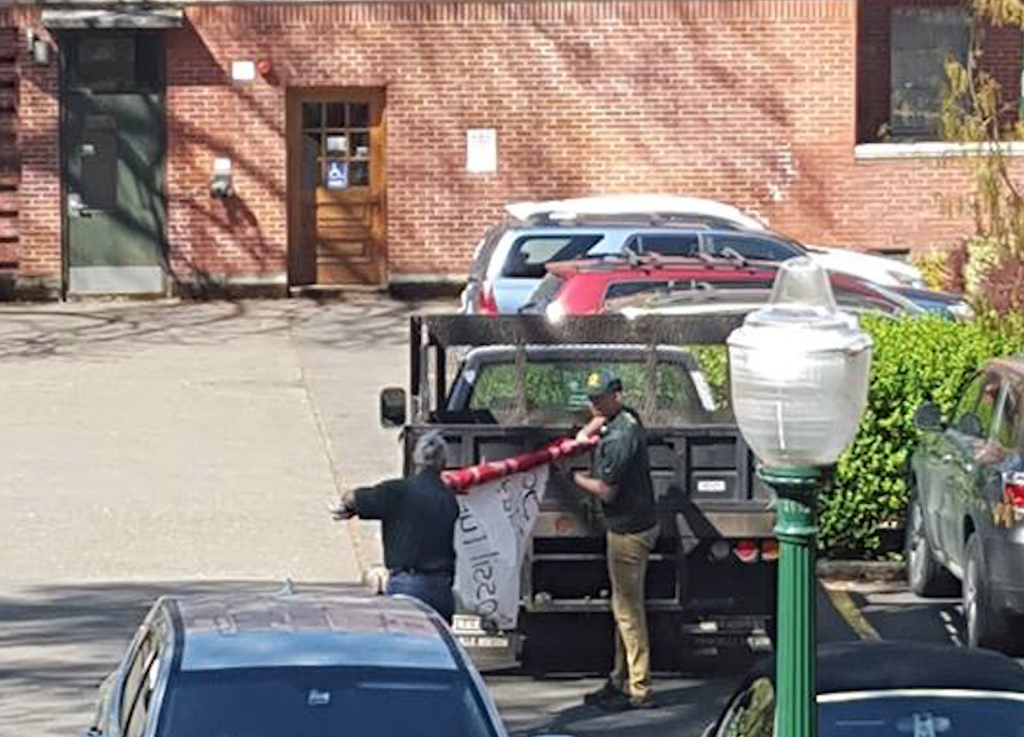

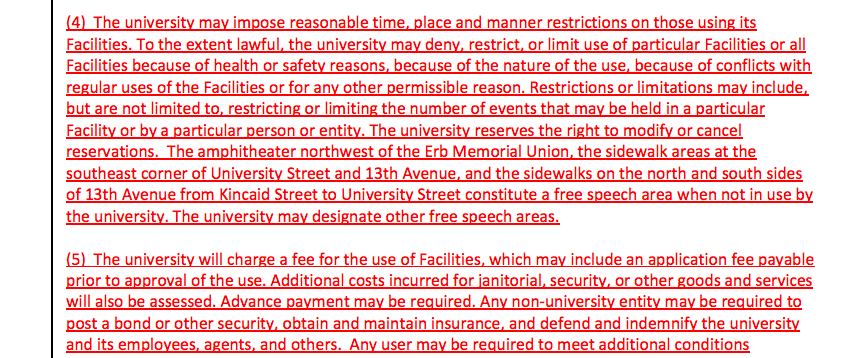

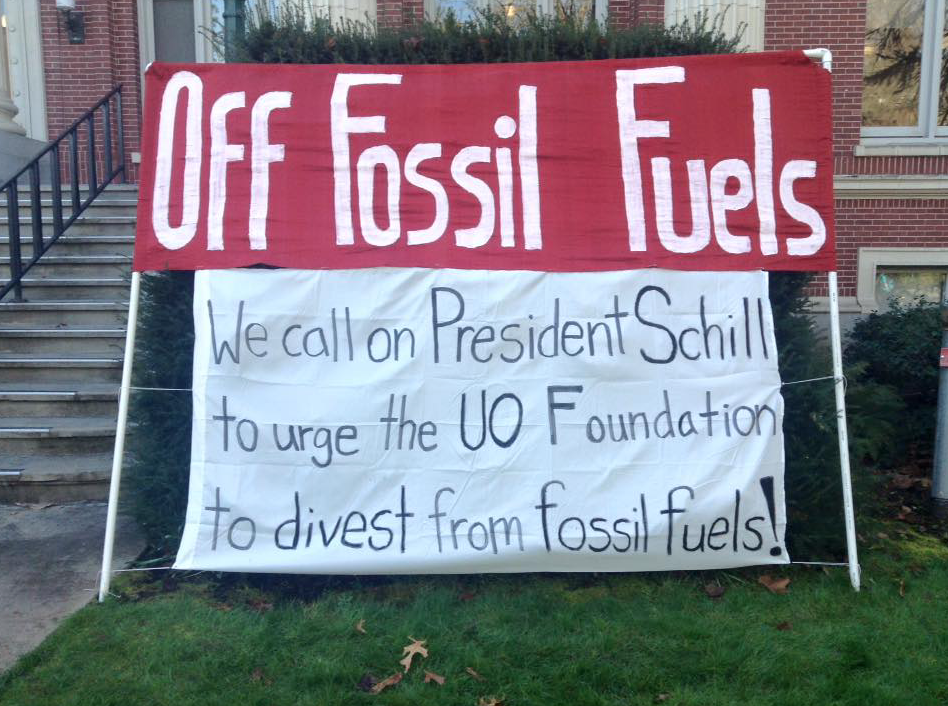
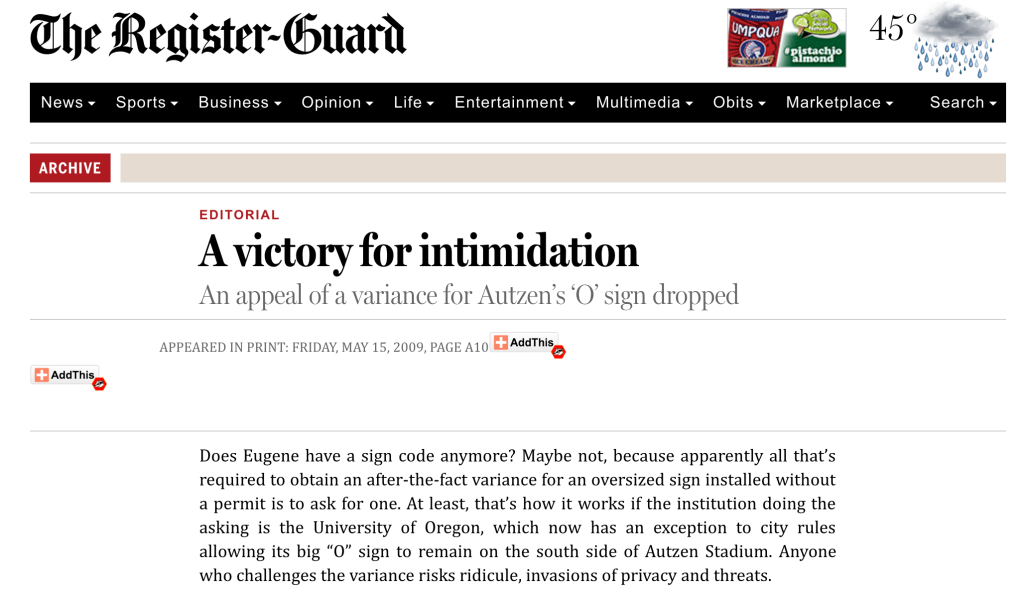
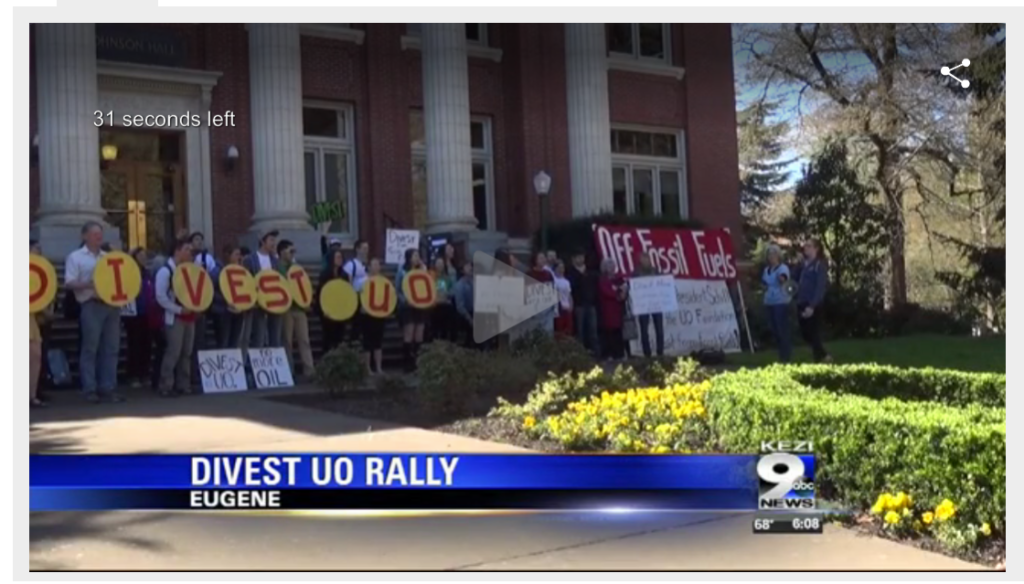
I wonder how many of these protesters will be flying out of Eugene and back in fossil fuel powered aircraft over the break.
Probably not too many on coal-fired planes.
But you can bet that they will be travelling on diesel powered trains.
The theory of public goods covers this pretty well. There’s no hypocrisy here.
Reducing CO2 emissions is almost certainly a non-rival non-excludable public good. As with any public good, voluntary efforts to provide it, such as walking back home for spring break to reduce emissions, will suffer from rational free-riding even among those who have a strong preference for the good. The normal solution to this market failure is collective action.
Our students are engaged in that collective action by trying to limit the ability of fossil fuel producers to raise capital, therefore driving up their costs and reducing CO2 emissions. The fact that the students are personally using goods and services that emit CO2 at the same time they protest is entirely rational. They’ve got a limited amount of time and effort to devote to CO2 reduction, and they’ve decided that the payoff from devoting this time and effort to collective action to reduce CO2 exceeds the payoff from individual efforts.
This is the same logic that drives countries to work for global agreements to limit CO2 at the same time that they are maintaining or even increasing their own emissions. These countries, and our students, are willing to adopt policies that will limit their own emissions (by increasing costs of airplane travel, for example) but only if others are also going to do so.
No one suggested hypocrisy is irrational. It is well, just hypocritical. Ironically, the only major industrial country to make headway on carbon emissions in recent years is the us, and the fossil fuel industry was a major contributor to the progress. An inconvenient truth. Global warming deserves our serious, consistent attention. Anything less is a sideshow.
It must take a professor to make such a casuistic argument! And I should add that a lot of the professors who voted in the UO senate for divestment will be flying off to vacations and conferences. No doubt very smug about their devotion to the public weal.
It is such thinking that dooms honest attempts to limit fossil fuel emissions. Worldwide emissions just keep going up and up and up — with an occasional break, e.g. for the Great Recession. As some of the most alarmist global warming people point out, the recent global agreement is little more than posturing, figleafs and purchase of indulgences.
It is nothing new, I’m sure. Al Gore buys “offsets” to atone for his lavish energy-hogging lifestyle.
And was it Augustine who said “Lord make me chaste, but not yet”?
By the way, coal is not the only fossil fuel. Airplanes most definitely run on fossil fuel — not solar energy. Nor wind!
So voluntary actions from an individual are vulnerable to free-riding, but voluntary divestment from a university isn’t? If students really care, they should support policy action at the national/international level. I’m surprised how much this blog has embraced the student divestment movement, which is in general a misguided approach and mostly reduced to symbolism.
I’m no socialist, but I buy the argument that each new university that divests increases the chances that other universities will divest. I also think that UO students are more likely to convince the UO Foundation to divest than, say, convince the government of China to burn less coal.
How does trading shares on a secondary market achieve this –> “Our students are engaged in that collective action by trying to limit the ability of fossil fuel producers to raise capital, therefore driving up their costs and reducing CO2 emissions. ”
I would agree if it were the primary market like an IPO or secondary offerings. But this is not. The price impact will be zero, it will not affect the cost of capital of these companies.
To “Trading Shares”:
The price impact will be negative. The textbook assumption of an infinitely elastic supply of capital is made for mathematical convenience, not because it’s literally true.
It’s hard to enter the bond market or get working capital from a bank when your stock price shows that the market doesn’t value your company’s underlying assets. The Economist has a good case study on Peabody coal that explains this, here: https://www.economist.com/sites/default/files/case_resolution_fictconsulting.pdf
Also to Trading Shares:
Furthermore, the threat of falling stock prices will induce properly incentivized corporate managers to shift capital and effort away from fossil fuel extraction towards other activities. This is already observable, and the divestment movement will accelerate it. The larger the expectation that divestment will increase, the faster it will happen.
Yes, and people who ever spent money on themselves instead of poor people aren’t allowed to advocate on their behalf. And anyone who’s ever had the slightest racist thought or comment themselves should never try to address racism in others.
Or, maybe we could all admit that there are systemic problems that it makes sense to address directly, whether or not we have changed 100% of what is possible to change in our personal practices.
Well of course we wouldn’t want to besmirch our campus by using our buildings as advertising space. Oh, wait… http://news.yahoo.com/photos/photo-taken-monday-may-18-2015-crew-eugene-photo-160825723.html
So easy to make PVC pipes foundational, so difficult to see students as foundational…
I was looking for some sort of campus-wide sign policy. I found this: https://cpdc.uoregon.edu/sites/cpdc1.uoregon.edu/files/SignPlanUPDATE01_25_13FINAL_0.pdf
Looks like it applies to building and parking signs, but may also apply to banners that are up for more than 30 days.
Is there a campus-wide sign policy? There should be. I’m all for free speech on campus, but we need to have some sort of review process for signage on campus. I don’t think banners consisting of hate speech in front of JH would contribute to the academic mission of the institution. On the other hand, the sign policy consisting of “whatever Administration dislikes” isn’t particularly useful either.
The First Amendment to the US Constitution is “foundational.” So is Article 1, Section 8, of the Oregon Constitution:
“No law shall be passed restraining the free expression of opinion, or restricting the right to speak, write, or print freely on any subject whatever . . . .”
The provision goes on to say that “every person shall be responsible for the abuse of this right,” but that takes place through defamation lawsuits, not prohibition and restraint. “Throwaway” writes this: “I don’t think banners consisting of hate speech in front of JH would contribute to the academic mission of the institution.” But that is not the test. Contributing to the academic mission of the institution is not a requirement for freedom of speech under Article 1 (USConst) and freedom of expression under Article 1, Section 8 (OrConst).
And within UO (which is subject to the US and Oregon Constitutions), the protections are equal or stronger. As President Schill said in the quoted paragraph, “A university encompasses the viewpoints of many people, all of which need to be protected . . . .”
We must hope that someone in UO has studied Oregon Constitutional Law.
Sign ordinances exist and while individual challenges to those ordinances have been accepted by the courts, they have not ruled that sign ordinances themselves violate the first amendment. UO should have one.
Good Lord! Directional signs and protest banners are completely different.
General Counsel drafted a “free speech” area for the area around the UO a couple of years ago. Once exposed, that went nowhere because it implied that speech elsewhere would not be free. Now the EMU (and Throwaway) are proposing that the law in front of Johnson Hall be designated as a “pre-approved speech signs only” area?
You have got to be kidding.
Sign ordinances cannot, and do not, apply to protest signs. Period.
Can you provide some links? And a copy of the “free speech area” proposal?
The fact that the UO is looking at how to quash speech rather than respond to it substantively is a sad sign. Nature doesn’t care about the optics. Either we shift funding away from fossil fuels as quickly as possible or we die.
Divest Now!
History will remember fondly those who moved early. Not so much those who waited til after the people started loudly demanding more. Those who drag their feet long enough after that will be remembered, but not in a nice way.
Divest Now! It’s one of the biggest ways you can help tip us toward a survivable and thrivable future.
“or we die” seems a bit hyperbolic.
“We” will die, in the sense of “We,” in the sense of the planet and species we have known, and some of us humans, are in fact dying from climate change. And more will die, as a result of extreme weather events.
Is this also hyperbolic?
“February smashed a century of global temperature records by “stunning” margin, according to data released by NASA.
“The unprecedented leap led scientists, usually wary of highlighting a single month’s temperature, to label the new record a “shocker” and warn of a “climate emergency”.
“The NASA data shows the average global surface temperature in February was 1.35C warmer than the average temperature for the month between 1951-1980, a far bigger margin than ever seen before. The previous record, set just one month earlier in January, was 1.15C above the long-term average for that month.”
and
““CO2 levels are increasing faster than they have in hundreds of thousands of years,” said Pieter Tans, lead scientist at Noaa’s Global Greenhouse Gas Reference Network. “It’s explosive compared to natural processes.””
https://www.theguardian.com/science/2016/mar/14/february-breaks-global-temperature-records-by-shocking-amount
Lots to potentially say here, but will keep it brief.
1. The best set of climate change white papers and impacts to the real world have been (and for a long time) produced by Munich RE
(google on that)
2. Yes CO_2 deposition into the atmosphere is acceleration – between Feb 2015 and Feb 2016 we saw an increase of 4 ppm (unprecedented but also seasonal – the annual increase now is
2.5–2.7 ppm)
3. Increasing weather volatility is likely the most physically reasonably manifestation of “climate change” and data since about 2010 support this. It has always been physically misleading and culturally defeating to claim this event as “Global Warming” and just talk about temperature changes, only.
4. Increases in vector borne diseases (already evidence for) and diminished fresh water capacity (lots of evidence for) are the two biggest impacts of climate change on humans.
5. It is always counter productive to talk about Climate Change in apocalyptic terms.
I find your point 5 to reflect a perspective born of vast privilege. If you are the average person in the world (an impoverished young man in China), while climate change may not mean human extinction it could certainly mean the end of “your” world. Here in the United States, many of us might muddle through. But in China? In India?
Back through the mysts of time, the 70s, I recall sitting in primary school dutifully watching the educational movie of the week, in which we were informed that the world would assuredly run entirely out of water in ten years.
At that tender age, I learned that those foretelling environmental apocalypse were not necessarily to be trusted.
Hmmm. One the one hand we have virtually all climate scientists in the world projecting catastrophic outcomes, and on the other other hand we have your story about an educational movie of the week. I just don’t know what to believe.
That’s a problem for you, I guess. As for me, I’ll continue to believe my own lying eyes…
(On global warming in general, I reserve judgement. The venom being thrown, though, makes me feel less convinced about it.)
The economist and socialist Henry George said something like “Foxes and men both eat chickens. The difference is the more foxes the fewer chickens, and the more men the more chickens.”
We’re not going to run out of anything that people can make money selling. But not many people are making money by selling CO2 reductions.
Ha, great quote!
To carefully split the hair, my little tale was intended as support for point 5 above, regarding the advisability of speaking apocalyptically about climate change. In particular, the danger of doing so is that if you’re ultimately wrong after running in circles shouting, you’re far less likely to be taken seriously in the future. Borrowing from Heinlein, if I ask a scientist what color a house in the distance is, I want them to answer, “white on this side, and I’m not sure about the rest”.
Its jayhawks, not foxes.
All of this comes from the 1888 book by Henry George
Population and Subsidence – the above quote is found
in chapter 2
This is a very interesting book and discusses the Malthusian catastrophe in some detail
Thanks for bringing up insurance company metrics regarding weather related issues. If any one institution would know about hedging weather disasters, it would be the one insurance corps can lay off their bets when they get too risky…
Mike Schil wrote this? “A university encompasses the viewpoints of many people, all of which need to be protected and most of which need to be accorded respect. This underlies our most fundamental principle-academic freedom. The university, through its president, should focus its speech on matters related to teaching, research, and operation of the university, not on those not central to our core academic purpose, no matter how important those matters are.”
What is he talking about? I have rarely encountered such a confusing pronouncement from other than a Republican Candidate for President.
We encourage our young people to prepare for the future by devoting their time and money to education. Might JH be supportive when the young people then ask the University to take a step that can help ensure that there will be a future?
During contract negotiations, SEIU was summarily kicked off Johnson Hall steps and told we’d have to rally ACROSS the street. Or else.
The cops are SEIU too, so good luck enforcing that.
Contract negotiations are governed by labor law.
When they’re running down my First Amendment right to hang a banner,
They’re walking on the fighting side of me.
https://www.youtube.com/watch?v=ZHAFmFsb9XM&nohtml5